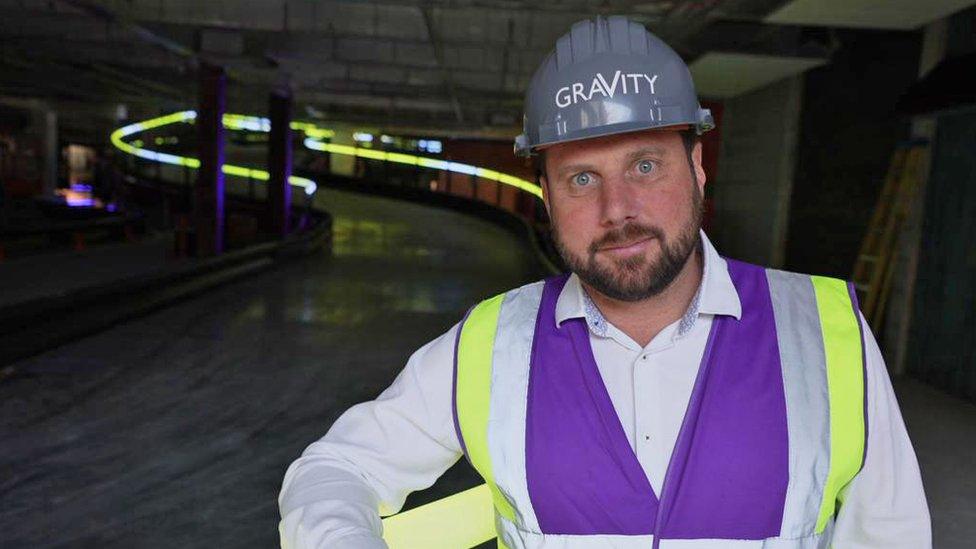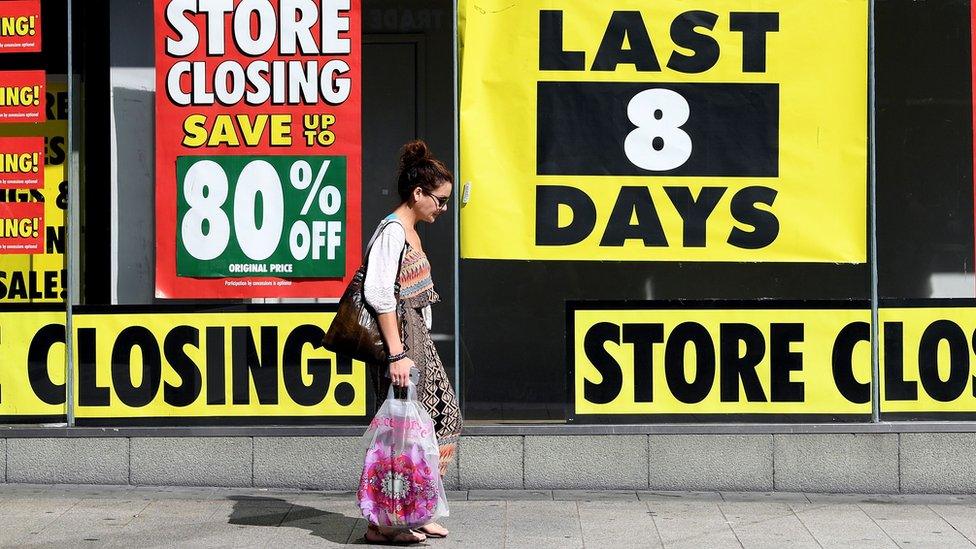The experiences replacing closed High Street stores
- Published

BBC business correspondent Emma Simpson tries out go-karting on a track in a former Debenhams beauty hall
I'm taking a spin on a go-kart track with a difference. It's the old beauty hall of the Debenhams store in south-west London.
The escalators are the only trace of the former department store which remain. All four floors are now being transformed into a high-tech entertainment venue.
As we filmed, shoppers stopped to take photos when the shutters briefly opened giving a glimpse of the flashing lights and builders beavering away inside.
"We're creating a department store of fun," says Michael Harrison, the co-founder of Gravity which is due to open on 1 August.
"We have three bars, two restaurants, go-karting, a bowling alley, huge screens to watch sporting events and adventure golf. This is the future of the High Street. It's about experience," he says.
Michael has no shortage of retail landlords now ringing him up offering him potential new locations.
They're grappling with the need to rethink, or repurpose, empty shops. Latest figures suggest one in seven stores, on average, are lying vacant. And in some places the number is far higher.
The UK's biggest property company, Landsec, owns the Southside shopping mall where Gravity is based. Its other centres include Bluewater in Kent and Trinity in Leeds.

Gravity co-founder Michael Harrison says commercial landlords are keen for him to set up more entertainment venues
Landsec boss Mark Allan thinks a quarter of what is currently retail space will need to be turned into something else.
"For me, it's really difficult to think of an example where you have 25% of something that it exists in the UK that is no longer required. And so you're not going to solve that sort of a problem by tinkering around the edges," he says.
The pain won't be evenly spread either, says Mr Allan: "Some places are going to be virtually empty and they are not going to survive as retail in any shape or form.
"Some are going to be absolutely fine - rents are lower, sales are lower and they're worth less than they were but fundamentally they've got a role to play longer term and some places are going to be in the middle where they are going to survive but they need some investment."
Some industry experts think the amount of redundant retail space is even higher. So how did we get here?
We've seen a huge proliferation of shops over the last 40 years. Retail has just been growing and growing, from out of town retail parks and shopping centres to so called clone towns dominated by chains, who were willing to pay higher rents.
That retail property boom is now over. Many of our town centres will have to find a new purpose.

Landsec chief executive Mark Allan says people need to come together to reshape their town centres in new ways
We've been talking about how to save the High Street for more than a decade but the pandemic has turbo charged the problems now.
Mr Allan says it's time to act. "Covid has been a tipping point. If we don't tackle it over the next couple of years together then there's a real risk some of this redundant retail property sits there for decades empty and that would be a disaster for the communities where that property is located."
And he says there's no single party that can solve the problem: "This needs people to come together. I think it's a significant moment and a really big opportunity, particularly for those centres and high streets where there is no future for retail, for radical, bold, thinking. I think it could be exciting."
Stockton-on Tees has one of the boldest plans to reshape its entire town centre. It has decided to demolish a large part of its high street.
The local council bought Stockton's two shopping centres and plans to knock one of them down, creating a new riverside park to make the town a greener, nicer place.
The £37m project is largely being funded with money from the Tees Valley Combined Authority and the Government's Future High Streets Fund.
The Castlegate mall was built in the 1970s, an era when local authorities were falling over themselves to attract big retail development.
Former staff reminisce about life at their town's Debenhams branch
"Retail is still very important, but we now need to consolidate it to meet the demand," says councillor Nigel Cooke, cabinet member for regeneration.
Businesses who want to stay will eventually move into the other shopping centre further up the street.
The scheme is part of a wider masterplan to market Stockton as an events town. The main high street, the widest in the UK, has been spruced up with new paving, lighting and a big water fountain. The council is also paying for the renovation of the town's Grade II-listed art deco Globe Theatre.
"I think it is money well spent and I am convinced it's the right thing to do. We need to get people back onto the high street either to live, to work or to enjoy themselves," insists Mr Cooke.
"It would be easy to hide under my desk and say guys, we can't do anything, let's just wait for the good times to come back. But we have to do something.. nothing is risk free, it's about managing the risk."
But Stockton has now got a large, empty Debenhams to contend with, too.
Town centre regeneration is often complicated stuff, with a myriad of owners, stakeholders and issues to solve.
It's taken Stockton 13 years to get this far and it's only a third of the way through. But given the magnitude of the challenges now, doing nothing is no longer an option.
- Published20 July 2021

- Published30 April 2021

- Published16 July 2021
